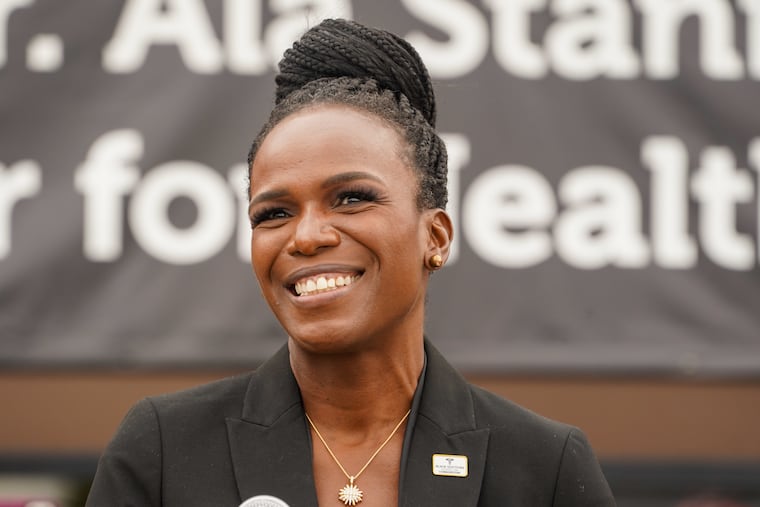Ala Stanford’s new book is equal parts memoir and rallying cry for health-care equity
The founder of the Black Doctors COVID-19 Consortium and former U.S. Department of Health and Human Services regional director traces her rise from poverty to become a household name in Philadelphia.

It gives me pause each time I hear of a friend or acquaintance getting sick with COVID-19.
It’s a stark reminder to keep a KN95 mask in my purse. I don’t care if I do get looks; I still mask in crowded, enclosed spaces. The United States is in the midst of what might be the largest COVID-19 summer surge ever.
Still, the pandemic and its related shutdowns feel like they happened an awful long time ago.
Memories of those unsettling times came flooding back to me over Labor Day weekend after I settled down on the beach to read a new memoir by Ala Stanford. Take Care of Them Like My Own is the inspirational story of Stanford’s extraordinary rise from poverty to become a board-certified pediatric surgeon, as well as a household name in Philly for helping save countless lives during the COVID-19 pandemic.
She’s a legend in this city.
I’ve personally been in awe of Stanford ever since meeting her in 2010 and interviewing her about performing a series of successful surgeries on a little Haitian girl who had been born with a congenital birth defect.
She’s accomplished so much. Her book, subtitled, “Faith, Fortitude, and a Surgeon’s Fight for Health Justice,” is really well done. Whenever I put the book down, my husband would pick it up and start reading it himself. Calling her book, published last month by Simon & Schuster, a memoir doesn’t do it justice. It’s so much more than that. It’s also a manifesto exposing the implicit bias that is rampant in health care and the need for equality and racial justice.
During those early, dark days of the pandemic, there was a lot of hand-wringing by health experts about how the virus disproportionately impacted African Americans. COVID tests were in short supply. People were getting turned away from health-care facilities because their symptoms were considered mild or because they weren’t elderly. Others didn’t know where to go or didn’t have a car for drive-up testing options.
As Stanford points out in her book, “There were no testing sites in the ‘hood.’” I interviewed Stanford about what was going on in April 2020, and by the time I circled back a few days later, she had created the Black Doctors COVID-19 Consortium and literally taken to the streets to personally test people for the coronavirus.
She didn’t have to do this. At the time, she was running a concierge medical practice catering to celebrities such as Will Smith. Stanford easily could have sheltered in place with her family in the suburbs until things blew over. Instead, she risked everything to step out on her own and help Philadelphians get the care they needed.
At first, Stanford rode around in a van driven by her husband to residents’ homes where she conducted on-the-spot nasal swab tests. But Stanford quickly realized she needed to come up with a way to reach more people, and decided to start going to Black churches to conduct testing. People waited for hours in long lines in church parking lots to get tested by her and her associates.
When the COVID-19 vaccine became available, I was a little leery, like a lot of folks. I didn’t trust Operation Warp Speed, a Trump administration initiative to manufacture COVID-19 vaccines as fast as possible. It turns out that despite the brave public face she put on, Stanford had her own reservations about it, as well.
“Black Ala wasn’t sure she was going to do this,” she writes. In the book, she reveals that she contracted COVID in August 2020. Because she still had so many antibodies in her bloodstream, she could easily have waited. But Stanford recognized her role in Philadelphia, and how much faith we put in her.
Despite her own fears, she once again put others over self. On Dec. 16, 2020, Stanford and other members of her staff braved a snowstorm to show up at the city health department and get vaccinated. Once she’d gotten her shot, I immediately resolved to get vaccinated, as well. Untold others did the same. There’s no telling how many lives she saved.
After life in Philadelphia finally began to return to normal, Stanford easily could have retreated back to her comfortable, private life. Instead, in 2021, she opened the Dr. Ala Stanford Center for Health Equity, a one-stop shop for preventive care, behavioral health, and social services in North Philadelphia. For a time, she was a regional director for the U.S. Department of Health and Human Services.
Then, in July, she joined the faculty of the University of Pennsylvania, where she’ll not only be teaching but also conducting research and doing community outreach.
On Tuesday, she’ll read from her memoir at a 5:30 p.m. book signing at the University of Pennsylvania Bookstore at 3601 Walnut St. I might swing by and get her to sign my copy.
I’m in awe.